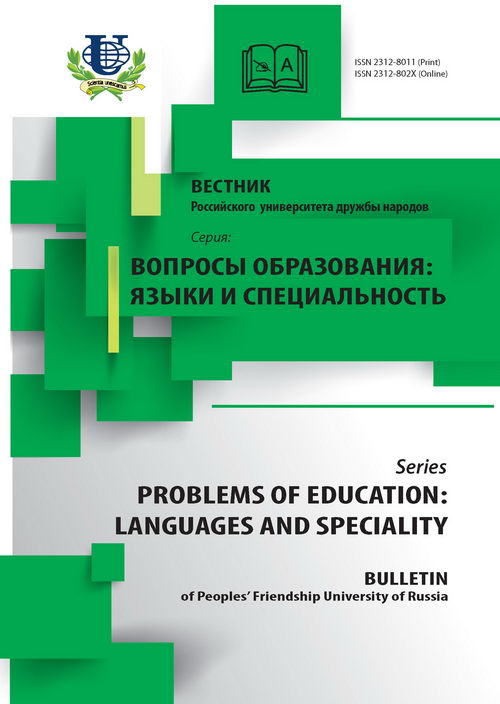№ 1 (2014)
- Год: 2014
- Статей: 29
- URL: https://journals.rudn.ru/polylinguality/issue/view/196
Редакционная статья
Формирование исследовательской компетенции студентов вуза в свете требований ФГОС нового поколения
Аннотация
Статья посвящена проблеме формирования научно-исследовательской компетенции студентов вуза в условиях перехода на стандарт нового поколения. В статье рассматривается организация научно-исследовательской работы со студентами в высшем учебном заведении, выделяются направления и формы работы со студентами в рамках компетентностного подхода.
Полилингвиальность и транскультурные практики. 2014;(1):7-12
 7-12
7-12


Профессионально ориентированная речевая деятельность студентов-нефилологов на занятиях по русскому языку и культуре речи
Аннотация
В статье анализируется профессионально ориентированная деятельность студентов нефилологических факультетов на занятиях и экзамене по русскому языку и культуре речи, обосновывается инновационный подход к созданию аннотации как средства формирования коммуникативной и предметно-профессиональной компетенции студента-нефилолога, приводятся примеры контрольно-измерительных материалов и конкретных заданий.
Полилингвиальность и транскультурные практики. 2014;(1):13-18
 13-18
13-18


Преподаватель русского языка как иностранного и новые технологии обучения
Аннотация
В статье анализируются возможные препятствия на пути внедрения новых технологий в практику обучения русскому языку иностранных учащихся. Особое внимание обращается на роль преподавателя в адекватной реализации методических новаций.
Полилингвиальность и транскультурные практики. 2014;(1):19-23
 19-23
19-23


Принципы отбора и презентации медицинских терминов в учебном терминологическом словаре нового типа
Аннотация
В статье рассматривается опыт создания учебного терминологического словаря по физиологии, определяются основные проблемы отбора и презентации медицинских терминов в такого рода словаре, приводится возможный вариант включения в структуру словарной статьи так называемых ассоциативных терминов на примере физиологической лексики.
Полилингвиальность и транскультурные практики. 2014;(1):24-28
 24-28
24-28


Тексты о свойствах в системе обучения студентов-иностранцев общению в учебно-научной сфере
Аннотация
В статье рассматриваются типологические разновидности научных текстов о свойствах, предназначенные для обучения иностранных студентов-аграриев общению в учебно-научной сфере. Представлен фрагмент урока учебного пособия.
Полилингвиальность и транскультурные практики. 2014;(1):29-34
 29-34
29-34


Сертификационное тестирование иностранных студентов-медиков в контексте новых ФГОС
Аннотация
Статья посвящена анализу структуры и содержания тестовых материалов профессионального модуля «Медицина. Биология» в свете требований федеральных государственных образовательных стандартов нового поколения. Предлагается вариант структуры и содержания субтеста «Письмо», отражающий изменения в содержании профессиональной деятельности современных специалистов-медиков.
Полилингвиальность и транскультурные практики. 2014;(1):35-40
 35-40
35-40


 41-47
41-47


Электронная лингводидактика: проблемы и перспективы
Аннотация
Использование компьютера как средства обучения в практике преподавания русского языка как иностранного повышает уровень языкового образования, расширяет возможности преподавателя, повышает интенсивность и результативность обучения.
Полилингвиальность и транскультурные практики. 2014;(1):48-52
 48-52
48-52


Формирование межкультурной компетенции: невербальное коммуникативное поведение
Аннотация
Рассматриваются актуальные проблемы обучения иностранных учащихся межкультурной коммуникации. На примерах несовпадений норм и правил поведения в разных этнокультурах обосновывается значимость невербального коммуникативного поведения при формировании межкультурной компетенции.
Полилингвиальность и транскультурные практики. 2014;(1):53-59
 53-59
53-59


 60-66
60-66


Язык и культура русских-липован в синхроническом и диахроническом аспектах
Аннотация
В статье рассматриваются некоторые фонетические и грамматические особенности языка русских-липован, проживающих на территории Румынии, обсуждается вопрос о диалектном характере этого языка. Представлена история липован, называются сферы и формы функционирования липованского языка.
Полилингвиальность и транскультурные практики. 2014;(1):67-70
 67-70
67-70


Развитие толерантности как лингвокультурной категории при обучении китайских студентов русскому языку
Аннотация
Работа посвящена актуальной проблеме формирования лингвокультурной толерантности у китайских учащихся как неотъемлемой части всего комплекса учебных задач. В статье рассматриваются особенности китайского менталитета и возможности комплексного развития коммуникативной компетенции и толерантности на материале текстов учебного пособия «Знаменитые имена России. ХХI век» [2] с использованием интернет-ресурсов.
Полилингвиальность и транскультурные практики. 2014;(1):71-75
 71-75
71-75


Этнокультурная и поликультурная идентичность иностранных студентов: от разобщенности - к гармонии
Аннотация
Успешная адаптация в новой среде невозможна без сохранения собственной культурной идентичности. В статье предлагаются примеры аудиторной работы на уроках РКИ подготовительного факультета, направленной на активизацию процесса этнической самоидентификации иностранных студентов.
Полилингвиальность и транскультурные практики. 2014;(1):76-80
 76-80
76-80


Сопоставительный анализ категории падежа имен существительных в русском и таджикском языках и формирование грамматических навыков у студентов-таджиков
Аннотация
В статье рассматривается категория падежа имен существительных на примере русского и таджикского языков. Проводится сопоставительный анализ категории падежа имен существительных на основе двух языков с целью преподавания РКИ в аудитории таджикских студентов: подачи знаний и формирования грамматических навыков.
Полилингвиальность и транскультурные практики. 2014;(1):81-86
 81-86
81-86


 87-90
87-90


Лексика семейных отношений в русской идиоматике: национально-культурный компонент
Аннотация
Проведен лингвокультурологический анализ лексики семейных отношений в пословицах и поговорках. Большое внимание уделяется описанию терминологии родства с целью установления национально-специфических и общеязыковых закономерностей речевого поведения и этикета, системы родства, которая определяет особенности социальной организации и структуры общества.
Полилингвиальность и транскультурные практики. 2014;(1):91-94
 91-94
91-94


 95-98
95-98


 99-104
99-104


 105-109
105-109


 110-114
110-114


 115-121
115-121


 122-127
122-127


Вербальные мнемотехники как механизм кодирования и декодирования информации
Аннотация
В статье рассматривается проблема использования вербальных мнемотехник в когнитивных процессах обработки информации. Экспериментально выявляются универсальные и индивидуальные стратегии кодирования и декодирования с учетом продуктивности этих стратегий для хранения и воспроизведения стимульного материала.
Полилингвиальность и транскультурные практики. 2014;(1):128-134
 128-134
128-134


Александр Твардовский и литература Орловского края
Аннотация
В статье впервые рассматриваются вопросы взаимодействия художественных миров А.Т. Твардовского и писателей Орловского края. Близость к мировосприятию И.А. Бунина, интерес к творчеству И.С. Тургенева позволяют говорить о глубине творческих связей Твардовского с писателями Орловщины в понимании смысла жизни, в ощущении природы, в любви к малой родине и ее природе.
Полилингвиальность и транскультурные практики. 2014;(1):135-142
 135-142
135-142


К вопросу о самоидентификации писателя в интервью
Аннотация
Интервью писателя - всегда интерпретация его творчества. Это интересно и автору, и читателю. Исследуя проблему самоидентификации писателя, авторы статьи анализируют различные подходы к диалогу с писателем, где целью разговора-интервью является самораскрытие творческой личности.
Полилингвиальность и транскультурные практики. 2014;(1):143-148
 143-148
143-148


Образ поэта и поэзии в творчестве поэтов Содружества «Перевал»: общий очерк
Аннотация
В статье впервые дается общий очерк классической темы «Поэт и поэзия» в творчестве поэтов Содружества «Перевал» в контексте литературного процесса 1920-1930-х гг. Развитие этой темы дает возможность говорить о поэтах-перевальцах как о продолжателях классической традиции А. Пушкина, М. Лермонтова, А. Блока и др.
Полилингвиальность и транскультурные практики. 2014;(1):149-154
 149-154
149-154


Музыка российского кино как средство социои лингвокультурной адаптации иностранных учащихся
Аннотация
В статье рассматриваются такие аспекты киновыразительности, как музыка и песни, анализируются вопросы их использования в процессе социо- и лингвокультурной адаптации иностранных учащихся к русскоязычной среде. В центре внимания - проблемы формирования и становления фонетической культуры русской речи инофонов.
Полилингвиальность и транскультурные практики. 2014;(1):155-160
 155-160
155-160


 161-165
161-165


Наши авторы
Полилингвиальность и транскультурные практики. 2014;(1):166-169
 166-169
166-169















